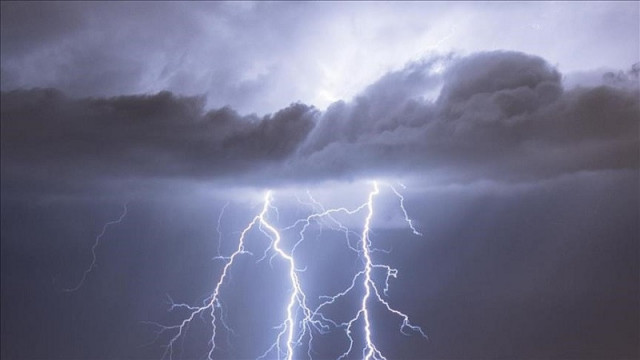'Climate impact' in Bangladesh: Lightning strikes kill 74 people in 38 days
Lightning killed 2,800 people in South Asian nation in past decade, with farmers being most vulnerable group

At least 74 people, including 35 farmers, were killed by lightning strikes over the last 38 days across Bangladesh until May 8, with experts telling Anadolu that climate change impact was the primary reason behind such incidents.
In the last eight days of May, 43 people were killed by lightning. In April, 31 people were killed by lightning strikes, according to a report released on Thursday by Save the Society and Thunderstorm Awareness Forum.
In a single day, 11 people died and nine others were injured by lightning strikes this May.
Over the past decade till 2021, lightning strikes have killed at least 2,800 people in the South Asian nation, official data shows.
Bangladesh being a delta country surrounded by the Bay of Bengal is experiencing more frequent and deadly lightning strikes.
Experts said it was apparently due to climate change.
Read also: Exceptional heatwaves scorch Asia, forcing schools to suspend classes amid health warnings
Kabirul Bashar, president of the forum and a professor at Jahangirnagar University, said that they have identified two reasons behind the increase in lightning strikes – the increasing impact of global warming and cutting down of trees in rural areas of Bangladesh, especially tall trees in the fields.
Echoing the same view, Shahriar Hossain, an environmental expert, told Anadolu that climate change remains a driving factor behind the increasing number of lightning strikes in Bangladesh.
An average of 300 lightning-related fatalities annually are recorded in Bangladesh, according to the UN.
Bangladesh this April experienced its longest heat wave in recorded history since 1948 and for the first time, nearly 75-80% of the country experienced continuous heat waves.
Read: Bangladesh reels under longest heat wave in 76 years
“Climate change is causing untimely rains, extreme heat, or late rain. Lightning strikes happen when the temperature on the soil surface rises against the air and environment,” Hossain explained.
“Furthermore, deforestation and reducing number of tall trees like palm are contributing to the climate disaster, threatening farmers who work in the open field,” said Hossain, who is also secretary-general of the Environment and Social Development Organization.
"But we can avoid death by climate disaster by increasing awareness, installing lightning absorber towers, and issuing weather forecasts," he suggested.



















COMMENTS
Comments are moderated and generally will be posted if they are on-topic and not abusive.
For more information, please see our Comments FAQ